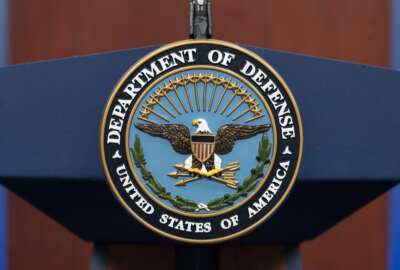Leadership, modernization key to fixing the VA
Amid the scandal over patient delays and falsified records at Veterans Affairs health facilities, numerous bills are circulating in Congress. But former VA...
Amid the scandal over patient delays and falsified records at Veterans Affairs health facilities, numerous bills are circulating in Congress.
But can a flurry of legislation and hasty congressional action provide a long-term solution to the VA crisis?
“That’s what I’m fearful of, is that Congress is going to overreact, as often happens, and bills are going to get passed that are not going to help, but are going to detract and take the focus away from VA,” said Anthony Principi, former secretary of the VA, on the Federal Drive with Tom Temin and Emily Kopp.
Four Senate Republicans proposed a bill Tuesday that would allow veterans to see a private doctor if they had to wait too long for an appointment at a VA hospital or clinic.
A similar bill in the House would require the VA to provide outside care to veterans who cannot be seen at clinics within 30 days.
Sen. Bernie Sanders (I-Vt.) has scheduled a hearing Thursday on a bill that would give the VA authority to remove senior executives based on poor job performance.
Appoint a strong leader
Rather than congressional action, Principi said strong leadership is the key to resolving issues at the agency.
“This is a very important decision President [Barack Obama] has to make in bringing on a leader, who is going to address some of these short-term and long-term problems and put in place mechanisms to deal with them,” he said. “You need someone with a lot of good experience, executive experience, hopefully someone who understands the VA and believes in the VA.”
Secretary Eric Shinseki resigned May 31 in light of the allegations. The Wall Street Journal reported that the President is considering Dr. Toby Cosgrove, chief executive of the Cleveland Clinic, to serve as VA secretary, but no official decision has been announced.
In the interim, Sloan Gibson, who was confirmed as deputy VA secretary in February, will act in Shinseki’s place.
“I would call in a brain trust,” Principi said as advice to Gibson. “Get the folks who are out there delivering patient care and helping to reduce the backlog of disability claims, and find out from them what are the solutions. … You need to hear from those people, not from a bunch of political appointees who may not know.”
When Principi served as VA secretary under President George W. Bush, he often consulted with a group of 10 VA senior executives before making important decisions.
“I wanted to have people around me who would tell me what I needed to know and put together a dashboard, so I knew on any given day what was going on in the system,” Principi said.
Keep bonuses for those deserving
The House passed a bill in April banning performance bonuses for VA senior executives. The Senior Executives Association sharply criticized the bill, claiming it “does nothing to address the critical issues of claims backlog and access to patient care.”
Principi agreed, saying that cutting bonuses is not the right solution at the VA.
“People go above and beyond the call of duty to do a good job. And to say, ‘well, you’re not going to be eligible for a bonus’ or ‘we’re going to take your civil service protections away,’ that’s not a response to this crisis,” Principi said. “We don’t want to lose good people. We want to keep them at the VA, and bonuses serve as an important incentive.”
Redirect funds to patient care
While some in government have raised concerns over bonuses in times of constrained budgets, Principi said redirecting funds is more critical.
“We need a BRAC-type system for the VA, to ensure that we have facilities where we need them. And those that we don’t need, we should close down and use those dollars to expand health care closer to veterans’ homes,” he said.
Modernizing systems and bringing the VA into the 21st century will also help to make more efficient use of appropriations. Principi said maintaining separate health care systems for the Defense Department and VA is “unsustainable,” especially with a shrinking military and veteran population.
“Problems arise in every agency of government,” Principi said. “It’s how you respond to those problems that makes a big difference.”
RELATED STORIES:
Senate Republicans offer alternative VA health bill
Senate to take up new VA bill after scandal
Who is Sloan Gibson? VA’s new temporary leader
Copyright © 2025 Federal News Network. All rights reserved. This website is not intended for users located within the European Economic Area.





